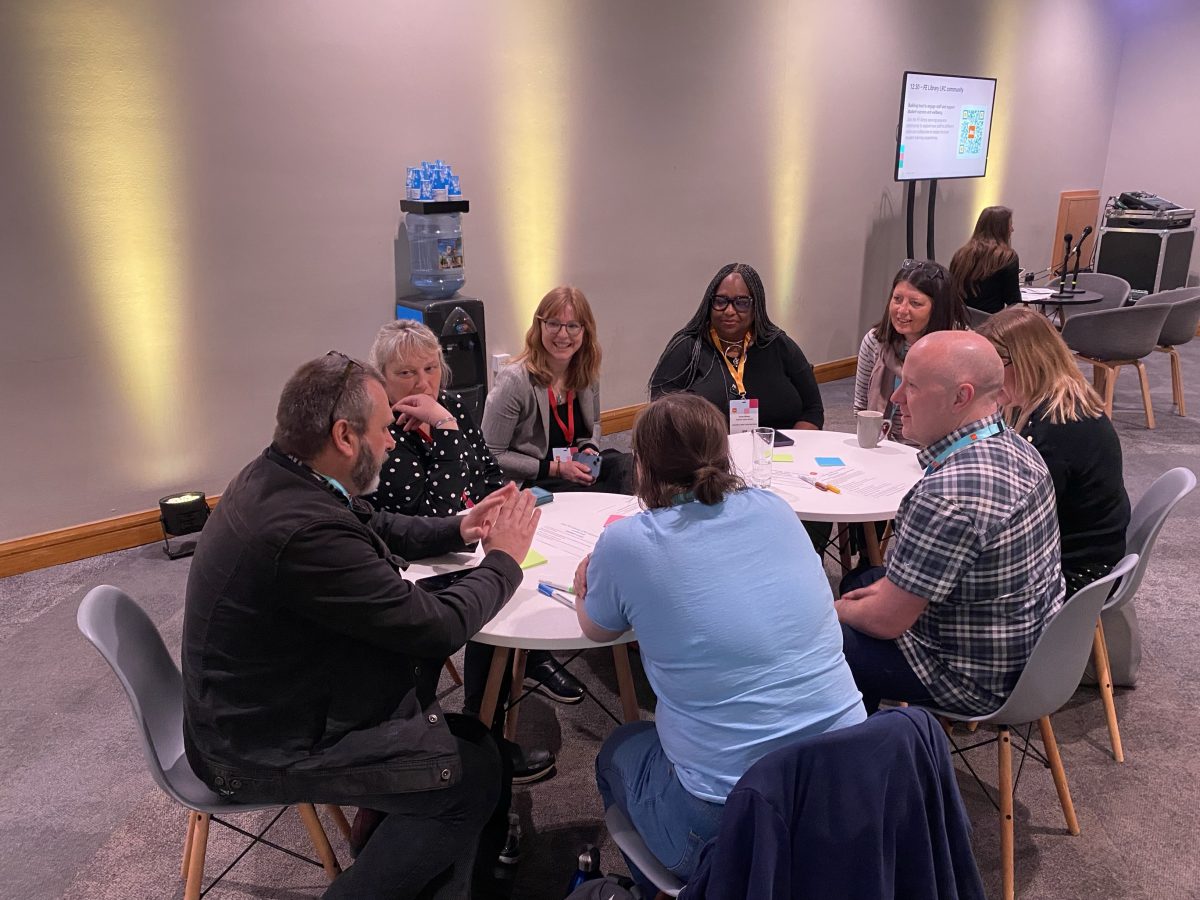With our FE Library LRC community approaching its fourth birthday, Digifest 2025 presented with an opportunity to try out some new things as part of the event’s community hub. Thank you to all our community members, allies, the community leadership team and Jisc colleagues for their participation!
Exploring collaboration

Our community members are around 450 staff, mostly managing and working in and around FE libraries and learning resources services. They can lack access to peers with similar professional backgrounds and roles within their colleges. At the same time, to support their students success and wellbeing it’s vital that they work as closely as possible with staff in other teams, especially when it comes to reaping the benefits of digital. A prime example would be when a college wants to maximise its investment in digital resources such as e-books: library staff, teachers and IT all have responsibilities to ensure that students can access quality information with ease.
Who is collaborating?
Within the workshop we met 27 participants. Whilst many were FE library LRC community members, we also welcomed some participants from HE and other roles including learning technology, student experience and data analytics. Despite differences in sector and role, there was much common ground to discuss.
“We all felt united by the need to find creative ways to collaborate with academic staff”
Jacinta Jolly
When asked who they were collaborating with, a common response was ‘everyone’! As expected, we heard lots of examples of staff working with teachers, lecturers, digital learning staff and IT. However, there were many more examples of teams that members were collaborating with, from additional learning needs and careers to students’ union, marketing, wellbeing and employability.

Examples of collaboration
Participants shared some of their successful collaborations, such as
- Facilitating events for other teams e.g. for International Women’s Day
- Bringing the training department into the library
- Offering work experience to students to support employability
Making digital resources available to students calls for collaboration in several directions. Members highlighted how they had worked together with teaching and IT staff to offer:
- Jisc-licensed content such as JSTOR and Gale
- E-books platform
- The library management system and online reading lists
- A ‘work, learn and life’ area on the VLE
Success factors
We asked participants to highlight what they considered their success factors when trying to collaborate with other roles. Interestingly, many point to practices which go beyond more traditional professional or technical expertise For example, members spoke of the value of
- Seizing opportunities and having a can-do attitude
- Taking advantage of those water cooler moments
- Using student voice
- Co-location, enabling a one-stop shop
- Being known as the go-to place for help
A recurring theme was the importance of strong leadership and communication:
- Knowing who to communicate with
- Getting buy-in from the right stakeholders
- Having leaders who understand libraries, enabling services to be integrated with the whole organisation
What would make collaboration easier?
Participants identified a number of elements which they felt would help them collaborate more easily in support of student success and wellbeing. These included steps to reduce or remove existing barriers or friction within business processes:
- Access to faculty meetings
- More advance planning to ensure all stay committed to agreed goals
- Chances for bite-size training moments
- Awareness of software development and deployment
- Removal of red tape
- Centralised systems
Several suggestions speak particularly to those seeking to lead digital transformation in colleges and universities:
- Having a shared vision and strategy (and agree what is meant by ‘student success’ and ‘student experience’)
- Enable understanding of what libraries (or other services) can do
- Build trust between diverse roles and teams
While we may plan to work together with other people or teams, events may not unfold as predicted so collaboration needs flexibility. Participants also drew attention to the importance of being open to chance encounters when communicating with colleagues across the organisation.
“I would emphasise how important it is for us to collaborate, within the community, between institutions and within our organisations. Libraries or learning resource centres can tend to be seen as siloes, but to flourish we really need to get out and talk with others in our colleges and universities, whether that’s in the tea room or a scheduled meeting. It is only then that we can build those links to ensure that we are best supporting our students and staff to promote all the amazing services and resources we already have, and forge bonds with others to discover what more we might offer.”
Jacinta Jolly
This short workshop gave us some valuable learning points for our FE Library LRC community and others seeking to collaborate in FE and HE. As our sectors face increasing financial pressure, it will become even more vital to understand the barriers to collaboration, and help staff build trust between their different professional cultures, teams and skillsets.
More community firsts
Our first Digifest workshop has helped us make the work of FE Library LRC community members more visible, and highlighted some commonalities with other staff groups. Talking of ‘firsts’, elsewhere on the Digifest programme we were also delighted to have our community chair, Jacinta Jolly (Deputy Head of Library Services (North) at NPTC Group of Colleges) taking part in the community champions’ panel, talking about how community participation supports her professional practice. Jacinta also teamed up with fellow community leadership team member Louise Ord (Learning Resource Centre Manager, Exeter College) to make a podcast about their Digifest 2025 experience.
Thankyou to all who made this year’s conference one to remember! If you’d like to know more about the FE library LRC community, or register to join, more information is available on our Get Involved page.

